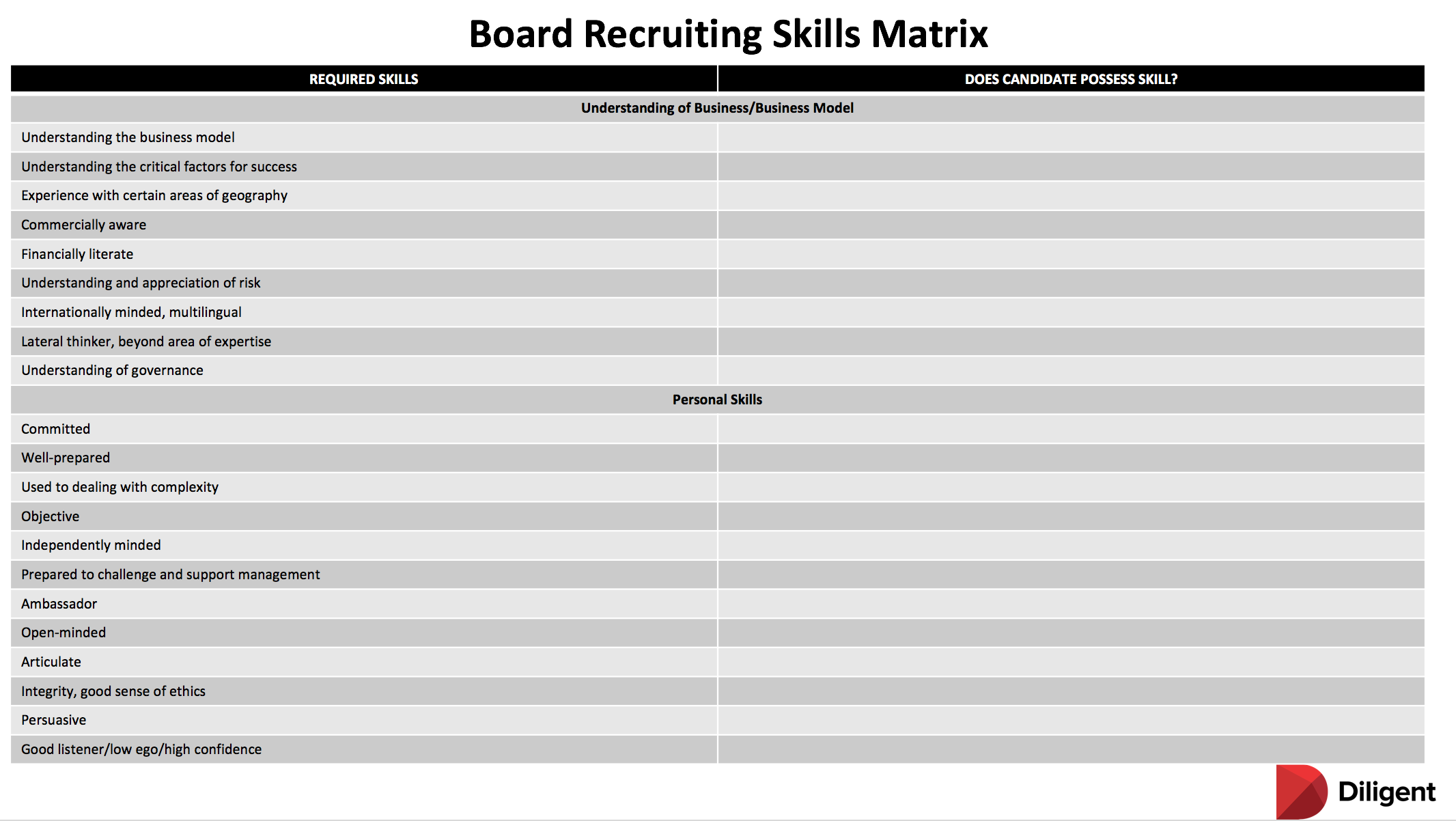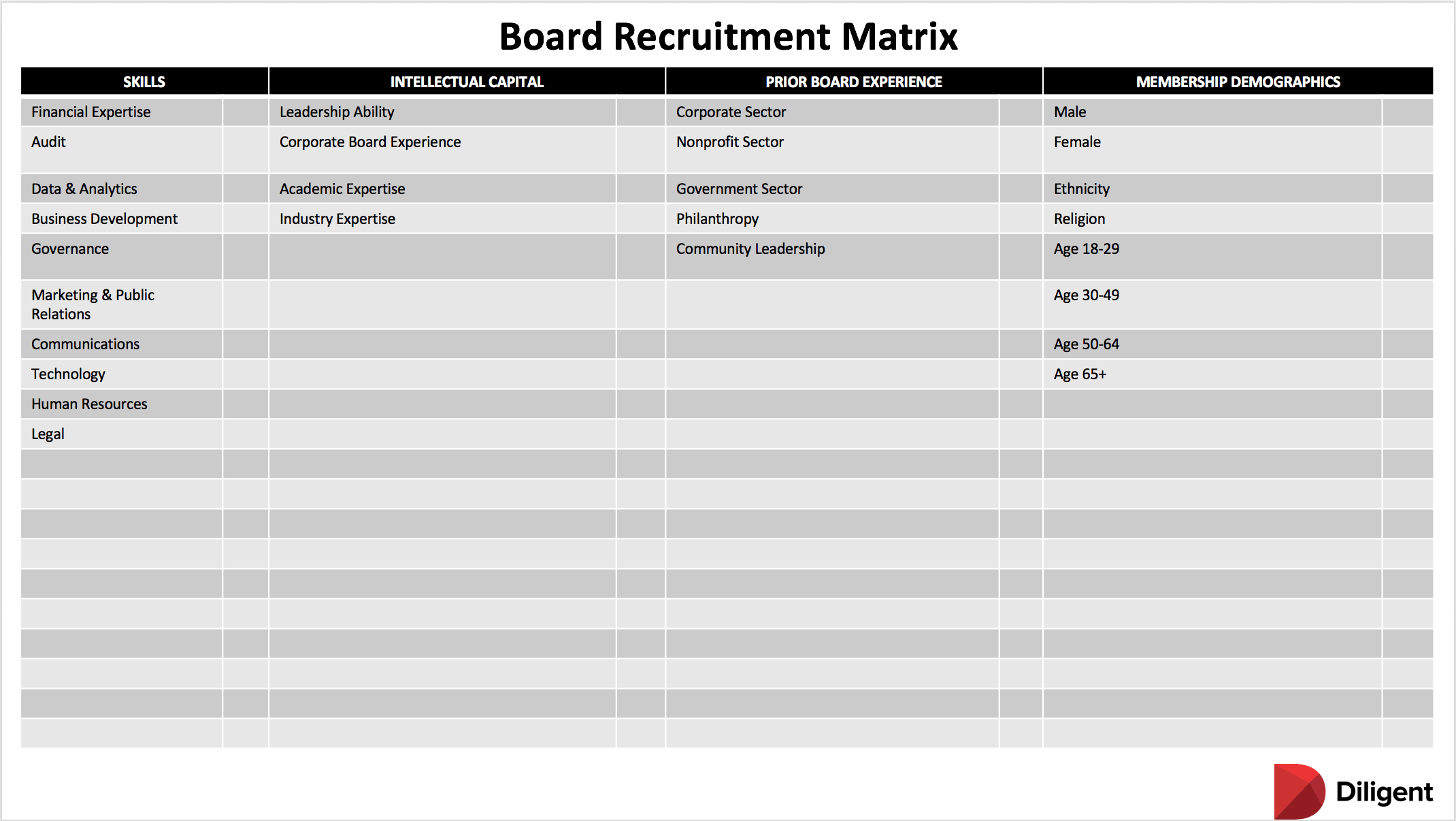Are you aware of how your nomination and governance committee approaches board recruiting best practices? How routine an undertaking is director recruitment for you and your board? If you’re a corporate secretary or other governance professional who works in the public sector, or if board refreshment has become your organization’s norm, you may already have incorporated best practices. Where do you start, though, if you replace directors as infrequently as you’d hope to need to replace a CEO?
As with most important undertakings, it helps to have a plan. In the case of director recruitment, this may begin with succession planning. Just as the board routinely reviews and assesses its CEO succession plan, your board will want to engage in advance board recruitment planning. If you find that your board waits until mere months before a vacancy occurs, or if you find yourself and your board scrambling to fill an unanticipated vacancy, you can add value by putting forward some best practices.
Understanding Board Recruiting Best Practices
This may well begin with your Nominating or Governance Committee (the lead committee) and its routine reviews of the board’s succession planning needs. Are such reviews embedded in the lead committee’s charter or terms of reference (TOR)? Some recruitment criteria may be obvious; others may be determined (or their merits validated) through reviews of the board matrix that you update on a regular basis.
Business contacts and networks have long represented a series of resources for board recruiting. We’re almost one-fifth of our way into this new century, though, and primary reliance on old practices and “old boys” networks doesn’t necessarily meet the needs of today’s boards. Rather, a board that is determined to recruit in the organization’s best interests will rely on networks – but not without also considering alternate sources and talent pools. A good board will establish a clear vision as to the expertise that is required in this era of change as it identifies and recruits prospective new members.
Rather than seeking to replicate outgoing directors’ strengths, the board will require context and an eye to the future: What are the organization’s potential opportunities and challenges in the next few years? If the board has recently selected a new CEO, or anticipates doing so in the relatively near future, this will represent an additional nuance in determining the expertise to be sought in prospective directors.
Board Succession Planning: Improving Board Recruitment Practices
If it’s been a while since your
board succession planning template was last revised, you and your board will want to go back to the drawing board. You’ll want to consider identifying and then tapping into expertise that can support effective oversight of the organization’s goals, opportunities and risks associated with artificial intelligence (AI);
cybersecurity; environmental, social and corporate governance (ESG) and more.
This needn’t be done at the expense of ensuring continuance of financial and other areas of expertise, but boards will logically and increasingly want to determine how and where to source talent associated with social media communications, technology strategy and other emergent oversight needs. Might this imply a modest increase to the size of your board? That’s a debate worth considering.
Once your lead committee and the board as a whole have agreed upon recruitment and
board composition needs, the next step is the identification of prospective candidates. This is where networks come into play, and boards can also turn to recruiters to identify talent. As the board prepares to recruit new members, you and your directors would be well served by a temperature check as to board culture.
Once your board has identified its future needs, you’ll want to check its willingness to change. Are your directors, individually and collectively, prepared to accept some changing of the guard? Will members welcome and support new directors whose age, gender, culture and leadership experiences may differ from the board’s norms to date? If you have any difficulty responding affirmatively to these two questions, you and your board chair may want to explore how you can support the board’s readiness for this aspect of the ongoing evolution of good governance.

Recruiting 101: How To Find the Right Skills
Whether your board recruits through an agency, firm or government body, you’ll likely be involved in updating and making accessible some key documents. In order to attract the best possible candidates, you’ll want to provide effective and appropriately focused overviews of the organization, the board and its role. You’ll want to ensure that the director job description you provide, whether it’s presented in the form of a charter or TOR, is current. Establish processes and timelines for applications and be clear about the board’s needs; what type(s) of expertise and diversity are you seeking? If you receive a submission from an otherwise strong director candidate whose expertise doesn’t align with the board’s current recruitment priorities, flag that talent for your chair and make a point of nurturing this contact. With all candidates, be as transparent as possible with respect to opportunities and timelines.
In recruiting, you want to manage expectations. That means communicating how much time is involved, and the scope of committee work and participation in events. You want to ensure that incoming directors are able to meet time and event commitments as well as attendance requirements. While it may be disappointing to miss out on a given individual’s expertise, contacts and more, it’s better for both parties to reach an early understanding that the time or opportunity simply aren’t right than to learn so after the fact.
Ideally, you’ll recruit once and once only for each position; it does no one any favors to have an incoming director struggle to meet board expectations, or to arrive unprepared for meetings. Your lead committee will want some confidence that candidates will not be overextending themselves with respect to time and service on other boards. Your lead committee will need to do its best to assess candidates’ motivations in seeking the directorship, and if they have a readiness to deliver on expectations and to act in the best interests of the organization.

Evaluating Board Recruitment Candidates
This leads to a key aspect of candidate recruitment and evaluation. The board will want to establish confidence that candidates understand the principles of governance. As boards recruit to meet evolving governance expectations, it’s a given that some new members will be first-time directors. They may have the ideal blend of experience, commitment and energy, but those considerations can be meaningless when directors come on board without a clear understanding of governance and directors’ accountabilities and responsibilities.
Some candidates make a point of securing education in order to build a governance knowledge base and to make themselves more attractive to boards. In Canada, the Institute of Corporate Directors (ICD) offers the
Directors Education Program (DEP), which it co-developed with the University of Toronto’s Rotman School of Management. Completion of this program can lead to an individual attaining the ICD.D designation. Standards for acceptance into the DEP program are not insignificant; ICD specifically cites business acumen and professional and director experience among its acceptance criteria. So, if your board evaluates the candidacy of an applicant who has completed the DEP and achieved the ICD.D designation, you are considering a candidate who has already demonstrated a significant commitment to understanding good governance.
Nomination and election or appointment practices will vary according to sector and, in the case of Crown or public sector boards, may reflect legislation.
As you and your directors refine or reflect on board recruiting best practices, invest time in also considering your onboarding practices. Do you have a good system that maximizes new directors’ capacity to readily come up-to-speed, or should you and the board tweak or overhaul your onboarding practices?
Ideally, your onboarding program includes a mentorship program. It should provide written guidance for both current and incoming directors, your mentors and mentees, as to their respective commitments and expectations. Mentorship should not be a one-way role; both parties will want to understand their accountabilities. When the board has recruited the right director and then delivers solid onboarding, development and mentorship programs, you’re positioning the board and your organization for success.







